人教版(2019)必修第三册Unit3 Diverse Cultures Vocabulary Expansion课件(66张ppt)
文档属性
| 名称 | 人教版(2019)必修第三册Unit3 Diverse Cultures Vocabulary Expansion课件(66张ppt) | 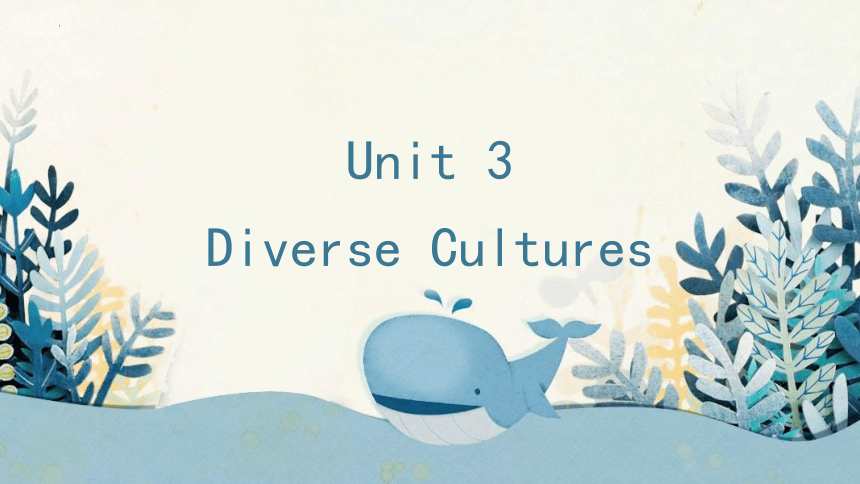 | |
| 格式 | zip | ||
| 文件大小 | 6.1MB | ||
| 资源类型 | 教案 | ||
| 版本资源 | 人教版(2019) | ||
| 科目 | 英语 | ||
| 更新时间 | 2022-05-11 20:39:04 | ||
图片预览




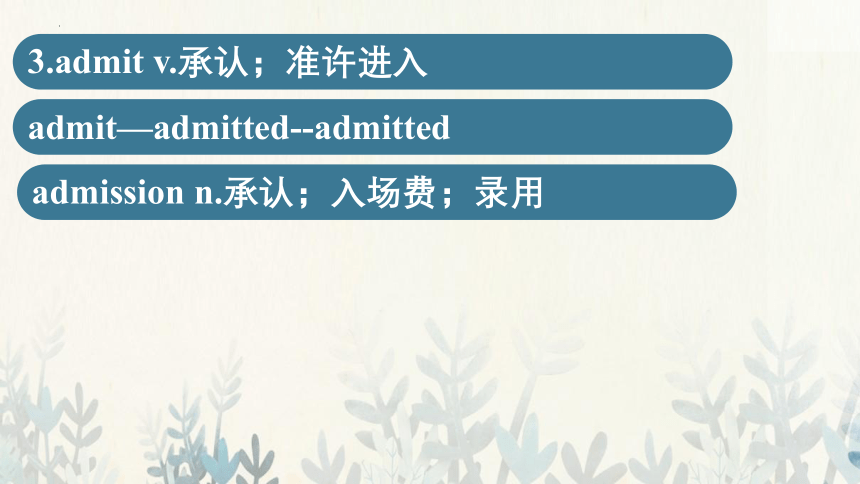
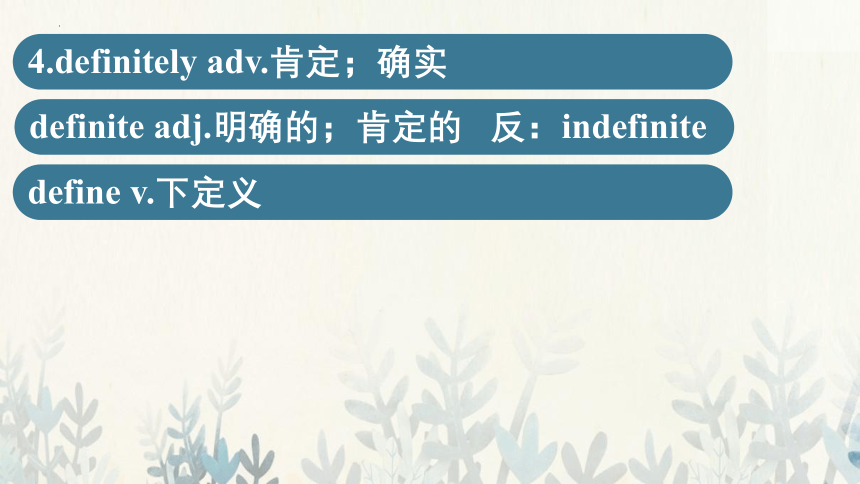

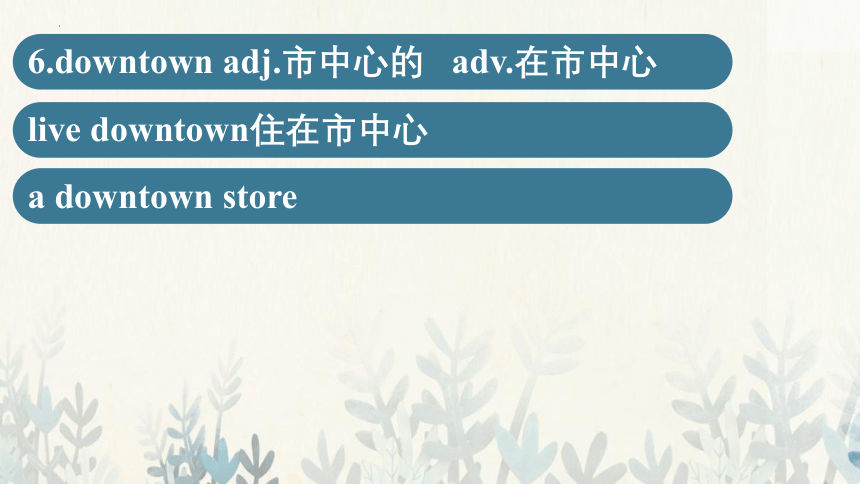
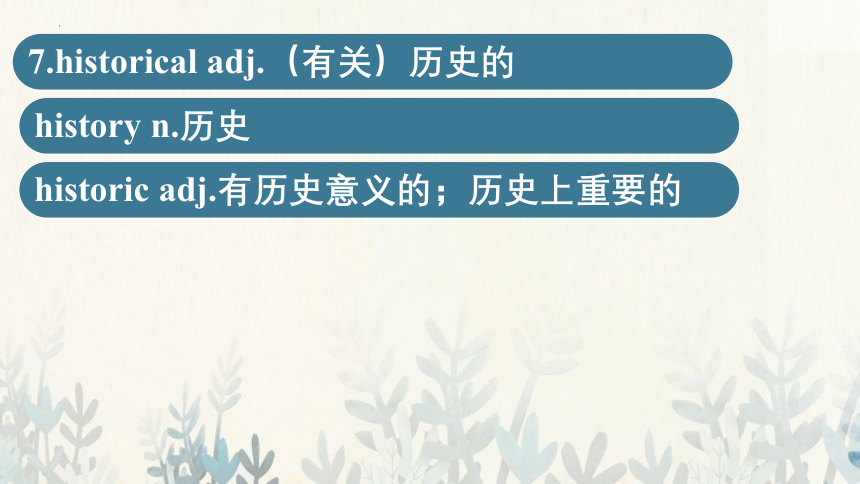
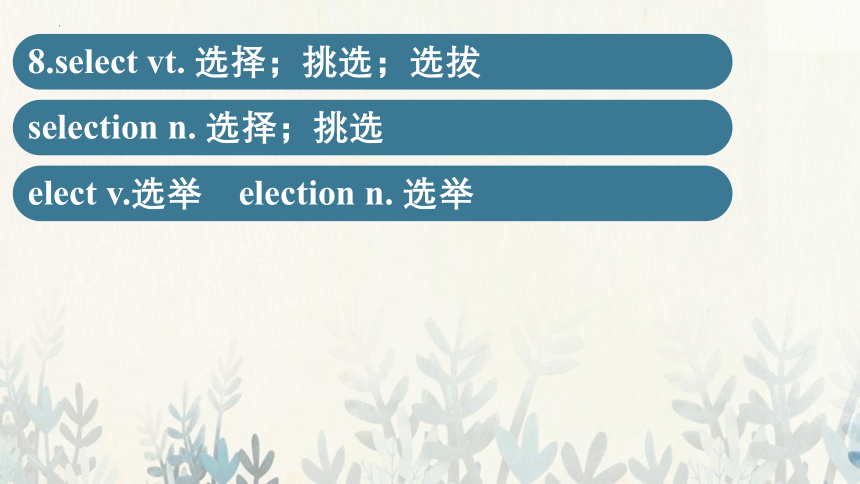
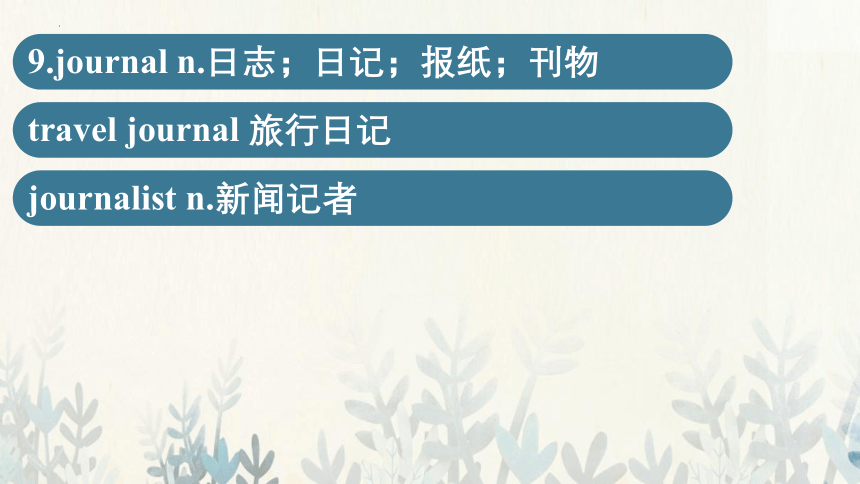
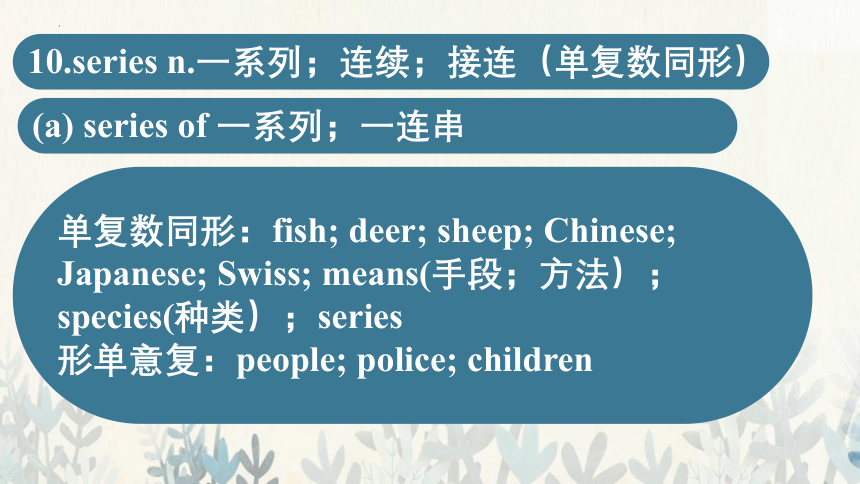
文档简介
(共66张PPT)
Unit 3
Diverse Cultures
Vocabulary Expansion
1.diverse adj.不同的;多种多样的
diversity n.差异性;不同点;多样性
various adj.各种各样的 variety n.多样性
2.fortune n.机会;运气
fortunate adj.幸运的 反:unfortunate
fortunately adv.幸运地 反:unfortunately
misfortune n.不幸
3.admit v.承认;准许进入
admit—admitted--admitted
admission n.承认;入场费;录用
4.definitely adv.肯定;确实
definite adj.明确的;肯定的 反:indefinite
define v.下定义
5.occur vi. 发生;出现
occur—occurred--occurred
occurrence n.发生;出现
6.downtown adj.市中心的 adv.在市中心
live downtown住在市中心
a downtown store
7.historical adj.(有关)历史的
history n.历史
historic adj.有历史意义的;历史上重要的
8.select vt. 选择;挑选;选拔
selection n. 选择;挑选
elect v.选举 election n. 选举
9.journal n.日志;日记;报纸;刊物
travel journal 旅行日记
journalist n.新闻记者
10.series n.一系列;连续;接连(单复数同形)
(a) series of 一系列;一连串
单复数同形:fish; deer; sheep; Chinese; Japanese; Swiss; means(手段;方法); species(种类);series
形单意复:people; police; children
11.apart from 除……之外
除……之外:aside from/except/except for/in addition to
12.minority n.少数民族;少数派;少数人
minor adj.较小的;较少的
反:majority-major
a/the majority of 大多数;大部分
a/the minority of 少数;少部分
13.bring about导致;引起
导致: result in/lead to/cause/contribute to
14.financial adj.财政的;财务的;金融的
finance n.金融;财政
15.poetry n.诗集;诗歌;诗作
poet n.诗人
poem n.诗
16.fold vt.包;裹;折叠
unfold v.展开;显露;打开
17.collection n.作品集;收集物;收藏品
collect v.收集;收藏
collector n.收藏家
18.percentage n.占比;百分率;百分比
percent n.百分之
19.settle v.定居;解决;结束
settlement n.解决;定居;协议
settled adj.稳定的;固定的
20.construction n.建筑;建造;建造物;结构
construct v.建造
constructive adj. 建设性的
21.clothing n.衣服;服装(衣服总称,不可数)
clothes n.衣服(具体;复数名词无单数)
cloth n.布
22.suit v.适合;满足……需要;相配;合身
n. 西服;套装
suitable adj.合适的;适当的
23.contain vt.包含;含有;容纳
container n. 容器;集装箱
24.neat adj.整洁的;整齐的;极好的
neatly adv.整齐地
25.Cantonese adj.广东的;粤语的 n.粤语;广东人
Mandarin n.普通话
英汉互译
1. 折叠/展开___________
2. 适合/合适的;适当的______________
3. 收藏/收藏品_____________
4. 除了……之外______________
5. 有毒的/毒药________________
6. 多种多样的/多样性______________
7. 幸运地/不幸地________________
8. 挑选 v./n.________________
fold/unfold
suit/suitable
collect/collection
apart/aside from/except/except for/in addition to
poisonous/poison
diverse/diversity/various/variety
fortunately/unfortunately
select/selection
Reading and Thinking
Para 1.
1.旧金山
2.做完某事之后
3.红杉林
4.纳帕谷
5.不得不做某事
6. 肯定;确定adv.
7.能够做某事
8.发生;出现
9.看法;风景;视野
10.金门大桥
Para 2.
1.市中心的;在市中心adj. & adv.
2.教会区
3.来自
4.中美洲
5.过去是/过去常常
/习惯于做/被用来做
6.事实上
7.一次艺术运动
8.“教会派”
9.被影响
10.涂鸦艺术
11.漫画艺术
12.街头艺术
13.活泼的;生动的adj.
14.以后;后来
15.墨西哥式中国面
16.流动餐车
17.一个真正的融合
Para 3.
1.在下午
2.向……前进
3.历史变迁
4.淘金热
5.来自
6.全世界
7.寻求致富成功之路
8.谋生
9.唐人街;中国城
10.其他人
11.参加;加入
12.干得好
13.一点
Para 4.
1.从……中选择
2.挑选;选择
3.粤菜馆
4.服务;招待
5.瓷盘
6.感叹句
Para 5.
1.将要做某事
2.爵士酒吧
3.里士满区
4.迫不及待做……
Before coming to San Francisco
Morning
Afternoon
Evening
Tomorrow
camped in the Redwood Forest and visited the wine country of Napa Valley
explored the neighborhood; learnt about Mission School Art; ate Mexican-Chinese noodles from a food truck
went to a local museum
went to Chinatown to enjoy some home style cooking
will go to a jazz bar in the Richmond District
Read the travel journal and complete the timeline.
1.What’s the main idea of the text
The meaning of travel.
The museum in San Francisco.
The author’s one-day trip to San Francisco.
The author’s first impression of San Francisco.
2.Before the author came back in San Francisco, the author visited ____________.
the Golden Gate Bridge
Napa Valley
The Mission District
Chinatown
3.When did the earthquake happen in the city of San Francisco
In 1906.
In 1848.
In 1806.
In 1948.
4.Why did Chinese immigrants go to San Francisco
To enjoy scenery.
To call on relatives.
To earn money.
To receive further education.
5.Where did the writer go for dinner
A Cantonese restaurant.
A jazz bar.
A shop.
A Mexican restaurant.
课文缩写填空
It definitely feels good to be back in San Francisco again. It’s a city that was able to rebuild __________(it) after the earthquake that __________ (occur) in 1906. My hotel is in the Mission District. This district used to be a poor area of town, but is now __________centre for art, music, and food. I walked around __________ (look) at the street art for a few hours. It was quite modern and lively. In the afternoon, I headed to a local museum that showed the __________ (history) changes in California. I learnt that America got California __________Mexico in 1848.
itself
occurred
a
looking
historical
from
In the same year, gold___________________ (discover) near San Francisco, __________started a gold rush. Many Chinese arrived during this period. __________(earn) a living, some opened up shops and __________ (restaurant) in Chinatown. Many others found jobs on farms, joined the gold rush, or went to build the railway that joined California to the eastern region of the country.
was discovered
which
to earn
restaurants
不规则动词
动词原形
occur
sit
eat
learn
come
become
find
build
leave
carry
动词过去式
occurred
sat
ate
learnt
came
became
found
built
left
carried
动词过去分词
occurred
sat
eaten
learnt
come
become
found
built
left
carried
非谓语:
1.Many of the people living here are from Mexico or Central America.
2.In fact, an art movement called the “Mission School” started here.
3.To earn a living, some opened up shops and restaurants in Chinatown.
Gramma 1
现在分词作后置定语:主动进行
过去分词作后置定语:被动完成
动词不定式作目的状语:目的未完成
1.Most of artists _________(invite) to the meeting were from South Africa.
2.The girl _________ (sit) by my side is my daughter.
3. _________(find) out more information about university courses, I wrote to him.
4.The boys _________ (gather) at the school gate are my classmates.
5.Do you know the number of people _________ (come) to the party
6.You should adapt to the _________ (change) situation.
invited
sitting
To find
gathering
coming
changing
定语从句:
1.In the same year, gold was discovered near San Francisco, which started a gold rush.
which引导非限制性定语从句,指代前面整个句子。
关系代词:that/which/who/whom/whose
关系副词:when/where/why
Gramma 2
1.The novel, _________ I read last night is very interesting.
2.Do you know the number of people __________ will come to the party
3.There were 3 sheep _______ were killed when lightning struck.
4.There were 3 sheep killed last night _______ lighting struck.
which
who/that
which
when
Reading for Writing
Para 1.
1.最大的
2.最古老的
3.旅游景点
4.接待
5.气候
6.温和的
7.全年;整年
8.打算;意味着;小气的
Para 2.
1.历史上
2.定居;解决
3.铁路修建
4.淘金热时期
5.住宅区
6.变成
7.大多数/大部分
8.居民
9.华人
10.非限定从
11.允许某人做某事
12.正宗的中国味
Para 3.
1.被摧毁;被破坏
2.重建
3.小心/留心/特地做某事
4.传统上
5.由传奇色彩的龙门
6.材料;物质的;实际的
7.由……捐赠
8.天后庙
9.广东银行
10.仅举几例
11.花费时间做某事
12.花园角广场
13.with复合结构
14.在现实生活中
15.中国象棋
16.打太极拳
Para 4.
1.各种各样的;一系列的
2.各种各样的
3.传统中草药
4.各种各样的
Para 5.
1.n.珍宝;v.珍视;珍爱
2.适合;套装
3.来自全中国
Para 6.
1.是……一个重要的部分
2.感受中国传统文化
3.亲自;亲身;第一手
不规则动词
动词原形
rebuild
build
spend
write
see
find
is
are
am
动词过去式
rebuilt
built
spent
wrote
saw
found
was
were
was
动词过去分词
rebuilt
built
spent
written
seen
found
been
been
been
Discovering Useful Structures
省略
简单句中的省略
并列句中的省略
复合句中的省略
其他省略
省略主语/宾语/主语+谓语
状从/定从/宾从的省略
动词不定式的省略
so/not的省略
介词的省略
简单句中的省略
1.(You) shut up!
2. Do you know Miss Gao
I don’t know (her).
3. (You come) this way, please!
(Have you) finished your homework
省略主语
省略宾语
省略主语+谓语
并列句中的省略
省略重复部分:
Tom picked up a book and Tom handed it to his teacher.
Jack must have been playing football and Mary must have been doing her homework.
His advice made me happy, and his advice made Jim angry.
复合句中的省略
一.状从的省略
1.在when/while/if等词引导的状语从句中,当主句主语跟从句主语一致且从句中含有be动词时,从句中的主语和be动词可省略。
When I was surfing the Internet, I downloaded the film.
2.当状语从句主语为it时,从句中的主语和be动词可省略。if possible/necessary/so/not/convenient
I will meet you if it is necessary.
3.than/as引导的比较状语从句常省略某些成分。
He runs as fast as Bob runs.
复合句中的省略
二.定从的省略
1.在限制性定语从句中,关系代词whom/whom/which/that在从句中作宾语时可省略;如前有介词则不能省。
The girl (that/who/whom) you met yesterday is my sister.
2.the way作先行词,后跟定语从句时,关系代词in which/that//.
The way (in which/that//) you speaks to your mom is impolite.
复合句中的省略
三.宾从的省略
1.及物动词后接宾语从句时,连接词that可省略;如连接两个或两个以上宾从,只有第一个that可省。
I believe that you are right.
He said that the story is interesting and that we all should read it.
2.when/where/how/why引导的宾语从句省略时,可只保留引导词。
I know that someone is coming, but I don’t know who is coming.
I know that you are angry, but I don’t know why you are angry.
其他省略
一.动词不定式的省略
1.afraid/anxious/eager/glad/happy/ready/willing to do作状语时,to后内容可省略。
You can force him to answer the question if he’s not ready/willing/happy/glad to answer the question.
2.使役动词/感官动词后的to do不定式需省略to, 但被动语态中to不能省。
Tom made Lily clean the room.
Lily was made to clean the room.
其他省略
一.动词不定式的省略
3.并列的to do不定式可省略后面不定式的to;但如有对比关系则不能省。
I’d like to sing and to dance.
It is important for students to study rather than to make friends.
4.介词but/except前有实义动词do的某种形式时,后面的不定式省略to.(前有do后无to)
All he could do was nothing but wait.
5.不定式在be going to/be able to/have to/ought to/used to后时,不定式可省略。
Are you a farmer? No,but I used to be (a farmer).
其他省略
二.使用so/not时的省略
Can you finish your work today
I think so./I don’t think so./I think not.
三.介词的省略
1.固定搭配省略:
have difficulty/trouble/problems (in) doing sth.
be busy (in) doing sth.
spend time (in) doing sth.
stop/prevent/keep sb. (from) doing sth.
Tom is busy (in) doing his homework.
其他省略
2.last/this/that/next/every/one/any/each/some/these/yesterday/
tomorrow不与介词at/on/in连用。
I will meet you next week.
She passed the exam this year.
1.I saw three buses pass by when ________(wait) for you.
2.Before _______(leave), turn off all the lights.
3.When ________(watch) the TV, I fell asleep.
4.He will come if ________(ask) to.
5.Unless _________(repair), the computer is of no use.
6.When ________(walk) the dog, you got lost.
waiting
leaving
watching
asked
repaired
walking
Thank You
Unit 3
Diverse Cultures
Vocabulary Expansion
1.diverse adj.不同的;多种多样的
diversity n.差异性;不同点;多样性
various adj.各种各样的 variety n.多样性
2.fortune n.机会;运气
fortunate adj.幸运的 反:unfortunate
fortunately adv.幸运地 反:unfortunately
misfortune n.不幸
3.admit v.承认;准许进入
admit—admitted--admitted
admission n.承认;入场费;录用
4.definitely adv.肯定;确实
definite adj.明确的;肯定的 反:indefinite
define v.下定义
5.occur vi. 发生;出现
occur—occurred--occurred
occurrence n.发生;出现
6.downtown adj.市中心的 adv.在市中心
live downtown住在市中心
a downtown store
7.historical adj.(有关)历史的
history n.历史
historic adj.有历史意义的;历史上重要的
8.select vt. 选择;挑选;选拔
selection n. 选择;挑选
elect v.选举 election n. 选举
9.journal n.日志;日记;报纸;刊物
travel journal 旅行日记
journalist n.新闻记者
10.series n.一系列;连续;接连(单复数同形)
(a) series of 一系列;一连串
单复数同形:fish; deer; sheep; Chinese; Japanese; Swiss; means(手段;方法); species(种类);series
形单意复:people; police; children
11.apart from 除……之外
除……之外:aside from/except/except for/in addition to
12.minority n.少数民族;少数派;少数人
minor adj.较小的;较少的
反:majority-major
a/the majority of 大多数;大部分
a/the minority of 少数;少部分
13.bring about导致;引起
导致: result in/lead to/cause/contribute to
14.financial adj.财政的;财务的;金融的
finance n.金融;财政
15.poetry n.诗集;诗歌;诗作
poet n.诗人
poem n.诗
16.fold vt.包;裹;折叠
unfold v.展开;显露;打开
17.collection n.作品集;收集物;收藏品
collect v.收集;收藏
collector n.收藏家
18.percentage n.占比;百分率;百分比
percent n.百分之
19.settle v.定居;解决;结束
settlement n.解决;定居;协议
settled adj.稳定的;固定的
20.construction n.建筑;建造;建造物;结构
construct v.建造
constructive adj. 建设性的
21.clothing n.衣服;服装(衣服总称,不可数)
clothes n.衣服(具体;复数名词无单数)
cloth n.布
22.suit v.适合;满足……需要;相配;合身
n. 西服;套装
suitable adj.合适的;适当的
23.contain vt.包含;含有;容纳
container n. 容器;集装箱
24.neat adj.整洁的;整齐的;极好的
neatly adv.整齐地
25.Cantonese adj.广东的;粤语的 n.粤语;广东人
Mandarin n.普通话
英汉互译
1. 折叠/展开___________
2. 适合/合适的;适当的______________
3. 收藏/收藏品_____________
4. 除了……之外______________
5. 有毒的/毒药________________
6. 多种多样的/多样性______________
7. 幸运地/不幸地________________
8. 挑选 v./n.________________
fold/unfold
suit/suitable
collect/collection
apart/aside from/except/except for/in addition to
poisonous/poison
diverse/diversity/various/variety
fortunately/unfortunately
select/selection
Reading and Thinking
Para 1.
1.旧金山
2.做完某事之后
3.红杉林
4.纳帕谷
5.不得不做某事
6. 肯定;确定adv.
7.能够做某事
8.发生;出现
9.看法;风景;视野
10.金门大桥
Para 2.
1.市中心的;在市中心adj. & adv.
2.教会区
3.来自
4.中美洲
5.过去是/过去常常
/习惯于做/被用来做
6.事实上
7.一次艺术运动
8.“教会派”
9.被影响
10.涂鸦艺术
11.漫画艺术
12.街头艺术
13.活泼的;生动的adj.
14.以后;后来
15.墨西哥式中国面
16.流动餐车
17.一个真正的融合
Para 3.
1.在下午
2.向……前进
3.历史变迁
4.淘金热
5.来自
6.全世界
7.寻求致富成功之路
8.谋生
9.唐人街;中国城
10.其他人
11.参加;加入
12.干得好
13.一点
Para 4.
1.从……中选择
2.挑选;选择
3.粤菜馆
4.服务;招待
5.瓷盘
6.感叹句
Para 5.
1.将要做某事
2.爵士酒吧
3.里士满区
4.迫不及待做……
Before coming to San Francisco
Morning
Afternoon
Evening
Tomorrow
camped in the Redwood Forest and visited the wine country of Napa Valley
explored the neighborhood; learnt about Mission School Art; ate Mexican-Chinese noodles from a food truck
went to a local museum
went to Chinatown to enjoy some home style cooking
will go to a jazz bar in the Richmond District
Read the travel journal and complete the timeline.
1.What’s the main idea of the text
The meaning of travel.
The museum in San Francisco.
The author’s one-day trip to San Francisco.
The author’s first impression of San Francisco.
2.Before the author came back in San Francisco, the author visited ____________.
the Golden Gate Bridge
Napa Valley
The Mission District
Chinatown
3.When did the earthquake happen in the city of San Francisco
In 1906.
In 1848.
In 1806.
In 1948.
4.Why did Chinese immigrants go to San Francisco
To enjoy scenery.
To call on relatives.
To earn money.
To receive further education.
5.Where did the writer go for dinner
A Cantonese restaurant.
A jazz bar.
A shop.
A Mexican restaurant.
课文缩写填空
It definitely feels good to be back in San Francisco again. It’s a city that was able to rebuild __________(it) after the earthquake that __________ (occur) in 1906. My hotel is in the Mission District. This district used to be a poor area of town, but is now __________centre for art, music, and food. I walked around __________ (look) at the street art for a few hours. It was quite modern and lively. In the afternoon, I headed to a local museum that showed the __________ (history) changes in California. I learnt that America got California __________Mexico in 1848.
itself
occurred
a
looking
historical
from
In the same year, gold___________________ (discover) near San Francisco, __________started a gold rush. Many Chinese arrived during this period. __________(earn) a living, some opened up shops and __________ (restaurant) in Chinatown. Many others found jobs on farms, joined the gold rush, or went to build the railway that joined California to the eastern region of the country.
was discovered
which
to earn
restaurants
不规则动词
动词原形
occur
sit
eat
learn
come
become
find
build
leave
carry
动词过去式
occurred
sat
ate
learnt
came
became
found
built
left
carried
动词过去分词
occurred
sat
eaten
learnt
come
become
found
built
left
carried
非谓语:
1.Many of the people living here are from Mexico or Central America.
2.In fact, an art movement called the “Mission School” started here.
3.To earn a living, some opened up shops and restaurants in Chinatown.
Gramma 1
现在分词作后置定语:主动进行
过去分词作后置定语:被动完成
动词不定式作目的状语:目的未完成
1.Most of artists _________(invite) to the meeting were from South Africa.
2.The girl _________ (sit) by my side is my daughter.
3. _________(find) out more information about university courses, I wrote to him.
4.The boys _________ (gather) at the school gate are my classmates.
5.Do you know the number of people _________ (come) to the party
6.You should adapt to the _________ (change) situation.
invited
sitting
To find
gathering
coming
changing
定语从句:
1.In the same year, gold was discovered near San Francisco, which started a gold rush.
which引导非限制性定语从句,指代前面整个句子。
关系代词:that/which/who/whom/whose
关系副词:when/where/why
Gramma 2
1.The novel, _________ I read last night is very interesting.
2.Do you know the number of people __________ will come to the party
3.There were 3 sheep _______ were killed when lightning struck.
4.There were 3 sheep killed last night _______ lighting struck.
which
who/that
which
when
Reading for Writing
Para 1.
1.最大的
2.最古老的
3.旅游景点
4.接待
5.气候
6.温和的
7.全年;整年
8.打算;意味着;小气的
Para 2.
1.历史上
2.定居;解决
3.铁路修建
4.淘金热时期
5.住宅区
6.变成
7.大多数/大部分
8.居民
9.华人
10.非限定从
11.允许某人做某事
12.正宗的中国味
Para 3.
1.被摧毁;被破坏
2.重建
3.小心/留心/特地做某事
4.传统上
5.由传奇色彩的龙门
6.材料;物质的;实际的
7.由……捐赠
8.天后庙
9.广东银行
10.仅举几例
11.花费时间做某事
12.花园角广场
13.with复合结构
14.在现实生活中
15.中国象棋
16.打太极拳
Para 4.
1.各种各样的;一系列的
2.各种各样的
3.传统中草药
4.各种各样的
Para 5.
1.n.珍宝;v.珍视;珍爱
2.适合;套装
3.来自全中国
Para 6.
1.是……一个重要的部分
2.感受中国传统文化
3.亲自;亲身;第一手
不规则动词
动词原形
rebuild
build
spend
write
see
find
is
are
am
动词过去式
rebuilt
built
spent
wrote
saw
found
was
were
was
动词过去分词
rebuilt
built
spent
written
seen
found
been
been
been
Discovering Useful Structures
省略
简单句中的省略
并列句中的省略
复合句中的省略
其他省略
省略主语/宾语/主语+谓语
状从/定从/宾从的省略
动词不定式的省略
so/not的省略
介词的省略
简单句中的省略
1.(You) shut up!
2. Do you know Miss Gao
I don’t know (her).
3. (You come) this way, please!
(Have you) finished your homework
省略主语
省略宾语
省略主语+谓语
并列句中的省略
省略重复部分:
Tom picked up a book and Tom handed it to his teacher.
Jack must have been playing football and Mary must have been doing her homework.
His advice made me happy, and his advice made Jim angry.
复合句中的省略
一.状从的省略
1.在when/while/if等词引导的状语从句中,当主句主语跟从句主语一致且从句中含有be动词时,从句中的主语和be动词可省略。
When I was surfing the Internet, I downloaded the film.
2.当状语从句主语为it时,从句中的主语和be动词可省略。if possible/necessary/so/not/convenient
I will meet you if it is necessary.
3.than/as引导的比较状语从句常省略某些成分。
He runs as fast as Bob runs.
复合句中的省略
二.定从的省略
1.在限制性定语从句中,关系代词whom/whom/which/that在从句中作宾语时可省略;如前有介词则不能省。
The girl (that/who/whom) you met yesterday is my sister.
2.the way作先行词,后跟定语从句时,关系代词in which/that//.
The way (in which/that//) you speaks to your mom is impolite.
复合句中的省略
三.宾从的省略
1.及物动词后接宾语从句时,连接词that可省略;如连接两个或两个以上宾从,只有第一个that可省。
I believe that you are right.
He said that the story is interesting and that we all should read it.
2.when/where/how/why引导的宾语从句省略时,可只保留引导词。
I know that someone is coming, but I don’t know who is coming.
I know that you are angry, but I don’t know why you are angry.
其他省略
一.动词不定式的省略
1.afraid/anxious/eager/glad/happy/ready/willing to do作状语时,to后内容可省略。
You can force him to answer the question if he’s not ready/willing/happy/glad to answer the question.
2.使役动词/感官动词后的to do不定式需省略to, 但被动语态中to不能省。
Tom made Lily clean the room.
Lily was made to clean the room.
其他省略
一.动词不定式的省略
3.并列的to do不定式可省略后面不定式的to;但如有对比关系则不能省。
I’d like to sing and to dance.
It is important for students to study rather than to make friends.
4.介词but/except前有实义动词do的某种形式时,后面的不定式省略to.(前有do后无to)
All he could do was nothing but wait.
5.不定式在be going to/be able to/have to/ought to/used to后时,不定式可省略。
Are you a farmer? No,but I used to be (a farmer).
其他省略
二.使用so/not时的省略
Can you finish your work today
I think so./I don’t think so./I think not.
三.介词的省略
1.固定搭配省略:
have difficulty/trouble/problems (in) doing sth.
be busy (in) doing sth.
spend time (in) doing sth.
stop/prevent/keep sb. (from) doing sth.
Tom is busy (in) doing his homework.
其他省略
2.last/this/that/next/every/one/any/each/some/these/yesterday/
tomorrow不与介词at/on/in连用。
I will meet you next week.
She passed the exam this year.
1.I saw three buses pass by when ________(wait) for you.
2.Before _______(leave), turn off all the lights.
3.When ________(watch) the TV, I fell asleep.
4.He will come if ________(ask) to.
5.Unless _________(repair), the computer is of no use.
6.When ________(walk) the dog, you got lost.
waiting
leaving
watching
asked
repaired
walking
Thank You
